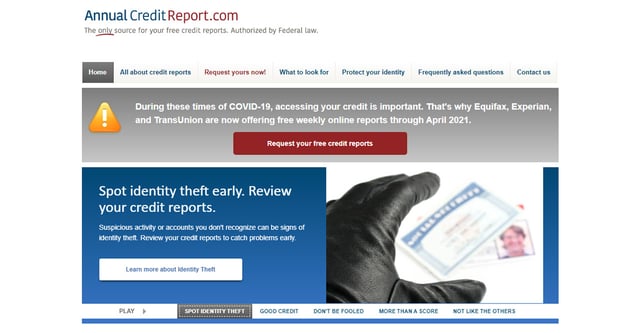Your credit reports and credit scores have a tremendous influence over your financial life. Good credit can open doors to competitive financing, inexpensive insurance premiums, and even job opportunities.
Bad credit, on the other hand, can make it difficult for you to qualify for even the most expensive extensions of credit. Even if you do qualify for financing or services with existing credit problems, you’re going to pay more.
It is critical that you check all three of your credit reports furnished by the major credit reporting agencies and do so often. They are simply too important to turn your back on them for an extended period.
The good news is that checking your credit reports is easy and free if you know where to get them.
Access Your Credit Reports at AnnualCreditReport.com
You have several ways to access your credit reports online, free of charge. For starters, federal law requires the credit reporting agencies give you free copies of your credit reports once every 12 months, but only when you ask for them.
The credit bureaus are not required to sneak up behind you and stick a credit report in your back pocket.
You can access your free federally mandated reports from Experian, TransUnion, and Equifax online at AnnualCreditReport.com. These free reports are one of the rights afforded to you under the Fair Credit Reporting Act (FCRA), thanks to a 2003 amendment to that Act called FACTA.
Normally, you have the right to only one credit report per credit bureau every 12 months, but that has temporarily changed. On April 20, 2020, the three credit bureaus announced they would allow consumers even more free credit reports than required in response to the Coronavirus pandemic.

You can access your credit reports for free each week through April 2021.
All three major credit reporting agencies are offering consumers free weekly access to their credit reports through April 2021. Again, you must make the request to take advantage of the offer.
In addition to your federally mandated free reports, you can find numerous websites that may offer you free credit report summaries. These so-called “freemium” sites will give you free monthly or even weekly access to one or more of your credit reports.
In exchange, however, you may need to agree to allow the company to market services or products to you.
Automated credit monitoring services exist as well, including some that will give you access to all three of your credit reports and your credit scores. Keep in mind, however, that while accessing all three of your reports and scores together may be convenient, such services often charge a recurring monthly fee.
What to Look for When You Review Your Credit Reports
Wherever you opt to access your credit reports, you should review all three of them often and make sure they are accurate. The credit reporting agencies work hard to make sure your reports contain accurate information.
Still, fraud and credit mistakes can occur. The only way to make sure your reports reflect a true picture of your credit history is to review these documents periodically on your own.
When you review your credit reports, be sure to keep an eye out for any potential red flags such as:
- accounts that do not belong to you
- inaccurate information about your accounts, such as balances or late payments
- unauthorized access of your credit reports (a.k.a credit inquiries)
- negative accounts that are too old to still be on your reports
Highlight any suspicious information you find and make a list. Should you discover any credit reporting errors, you’ll need to be able to explain the problem to the credit bureaus if you want to try to correct the problem.
What to Do If You Find Credit Report Errors
In addition to your free annual credit reports, the FCRA gives you many other rights where your credit reports are concerned. One of the most important rights this federal law confers to you is the right to dispute any information on your credit report that you believe is wrong or questionable.
You can dispute incorrect information on a credit report in several ways. All three credit reporting agencies will allow you to submit credit disputes via mail, online, or over the phone, based on your preference.
| Experian | TransUnion | Equifax |
| Experian P.O. Box 4500 Allen, TX 75013 |
TransUnion Consumer Solutions P.O. Box 2000 Chester, PA 19016-2000 |
Equifax Information Services, LLC P.O. Box 740256 Atlanta, GA 30374-0256 |
| 888-397-3742 | 800-916-8800 | 800-685-1111 |
| Dispute Online | Dispute Online | Dispute Online |
The FCRA requires the credit bureau to investigate your claim when it receives your dispute. In general, a credit bureau needs to complete its investigation into your claim within 30 days, but the process has become much more effective and efficient over time with automation. Most credit report investigations take no longer than 14 days.
At the end of the investigation period, the data furnisher (that’s the creditor, lender, or collection agency that reported the information to the credit bureau) can take one of three actions. The data furnisher can:
- confirm that the account is accurate, and the item you dispute will remain on your credit reports.
- inform the credit bureau to delete its account from your report.
- give the credit bureau new or different information and ask it to update the account.
Finally, if the data furnisher doesn’t respond to your dispute at all, the credit bureau will delete the account from your credit report because it is not verifiable. Whatever the outcome of your dispute, the credit bureau will notify you at the end of the process.
There is no guarantee a dispute will end the way you want it to. If you disagree with the outcome of the investigation, you can follow up with another dispute, submit a complaint to the Consumer Financial Protection Bureau (CFBP), or consider hiring a reputable attorney and pursue your FCRA rights.
Moving Forward
Remember that checking your credit reports once, or even once a year, isn’t enough to ensure your credit reports remain accurate. Credit reports aren’t static documents. For most people, they change multiple times each month.
It’s smart to review your credit reports often, perhaps even once per month. When you keep an eye on your credit reports, it can help you to protect yourself from fraud and make sure that your reports and scores stay in good shape.
Checking your credit reports often is the best way to know you can count on your credit when you need it. And, for the foreseeable future, it’s free to do.
Advertiser Disclosure
CardRates.com is a free online resource that offers valuable content and comparison services to users. To keep this resource 100% free, we receive compensation for referrals for many of the offers listed on the site. Along with key review factors, this compensation may impact how and where products appear across CardRates.com (including, for example, the order in which they appear). CardRates.com does not include the entire universe of available offers. Editorial opinions expressed on the site are strictly our own and are not provided, endorsed, or approved by advertisers.






![9 Credit Cards that Use Equifax Credit Reports ([updated_month_year]) 9 Credit Cards that Use Equifax Credit Reports ([updated_month_year])](https://www.cardrates.com/images/uploads/2017/11/equifax2.png?width=158&height=120&fit=crop)
![How to Freeze Your Credit Reports in [current_year] How to Freeze Your Credit Reports in [current_year]](https://www.cardrates.com/images/uploads/2018/10/CR-Cool.png?width=158&height=120&fit=crop)


![4 Tips: Getting Business Credit Cards with No Personal Credit Check ([updated_month_year]) 4 Tips: Getting Business Credit Cards with No Personal Credit Check ([updated_month_year])](https://www.cardrates.com/images/uploads/2017/10/biznocredit.png?width=158&height=120&fit=crop)
![7 Best Secured Credit Cards: No Credit Check ([updated_month_year]) 7 Best Secured Credit Cards: No Credit Check ([updated_month_year])](https://www.cardrates.com/images/uploads/2018/11/Best-Secured-Credit-Cards-with-No-Credit-Check.jpg?width=158&height=120&fit=crop)